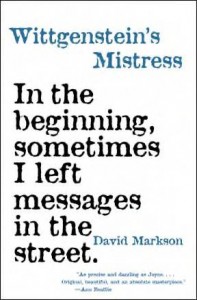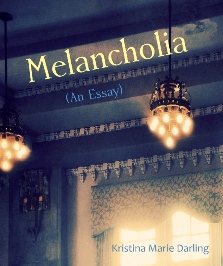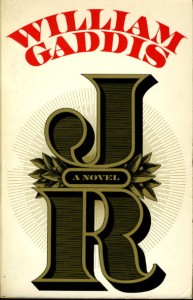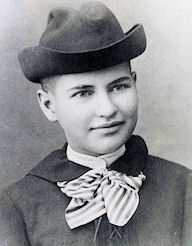Gaddis and J R: Life With, By and Before
J R
William Gaddis
Alfred A. Knopf, 1975
726 pages / $15.16 buy from Dalkey Archive or Amazon
By July I’d completed my yearlong ramble through DeLillo’s oeuvre. It was not one of the hottest summers I remember. I had a room in Crown Heights with a window that faced out to an alley, across which lived a Barbadian family, whom I was awoken by most mornings before biking the six miles, across Brooklyn, over the Manhattan Bridge, through Chinatown, to the parking lot behind the business school next to the library, where I rode the elevator to the tenth floor and worked for eight hours Monday to Friday. I had little idea or direction of what to do next.
I read Wittgenstein’s Mistress in about two sittings, during which I came to vaguely understand the significance of the name William Gaddis. All I knew when I dropped down to the eighth floor one afternoon to pick up the massive copy of The Recognitions was that it included a character who wore a clock as a necklace. The image appeared throughout Markson’s insane novel and recalled Flavor Flav, the refurbished and culturally derided figure of the preceding decade, which seemed enough for me.
It took me three attempts to get through the first ten pages. I’d decided with a friend that we would tackle it simultaneously, but he gave up a quarter way through the first chapter. He explained that he didn’t have any interest in dedicating his respite to a man baptized by Jonathan Franzen as “Mr. Difficult.” As a matter of contention or cultural superiority, or, more likely, personal superiority, I committed to reading the novel to completion and full understanding.
I did so, along the way reveling in what I referred to as the most conscious and hilarious diatribe on art ever penned. I was indoctrinated; by what I read, I found myself deeply shaken and moved.
A month passed. I signed a lease on an apartment with my girlfriend in a neighborhood that used to be a part of Flatbush but is now called Prospect-Lefferts Gardens and enrolled in my penultimate semester of college. I reread Hamlet and Heart of Darkness and The Waste Land. I read for the first time A Portrait of the Artist as a Young Man and Ulysses and “Ulysses” and “Prufrock” and Castle Rackrent. I had few conversations about Gaddis. I went out constantly for a few weeks and stopped. There was the hurricane and I walked across the Manhattan Bridge through a city without electricity to Madison Square Garden. I read Ben Gocker’s absurdly funny Content publication The Pisces on a bus from Philadelphia on three hours of sleep. I felt tired of writing. The insanity of the world seemed more sane. I was bored, watched hours of television. I still do. I’m still bored. And I thought, I think about The Recognitions regularly as this masterpiece of social and artistic criticism, the most effort ever poured into something’s message, which stands to say: It’s not worth it.
January 16th, 2013 / 1:11 pm
A Portrait of My Failures as a Critic
“Every book in the world is out there waiting to be read by me” – Roberto Bolano, The Savage Detectives
2012 took forever. Moments came and went when things seemed exciting or new or whatever, but all in all it was a long year filled with strange decisions and I came out of it with a pile of books that I’d either ordered late at night because I’d been struck with some desire to “know completely the works of Slavoj Zizek” or that I’d agreed impulsively to review a tome describing the life of such-and-such Avant Gardist because I liked the idea of discussing literature at length in a “public” arena like HTMLGIANT.
Because of this strong desire to be as well-read as possible, balanced against the harsh reality of not having enough fucking time on my hands, there’s now a plethora of things I haven’t finished, haven’t fully reviewed, or haven’t begun to understand that sit on my shelf that—although I can easily discern their respective merits—I can’t see having the time for in the foreseeable future. As a result I’m going to review them, or review their covers, or review their quotes, or whatever; as a collective mea culpa while perhaps discussing the rigors of ambition/the insurmountable plague that is my laziness.
On the surface, this is a lazy approach to make up for my being a disorganized moron; however when I look at these books and think of where I was when I threw my hat into the ring to review them I understand that there’s a bit more to it than that. As a reader—especially a young reader—I think it’s tempting to hope for some sort of Johnny Neumonic device that allows all of Tolstoy or Perec or whomever to immediately flood my consciousness. If this weren’t such a temptation, no living human would ever walk out of a bookstore with more than five books; and yet I typically see those favorite bloggers or writers of mine on the internet citing their interest in more like ten, or fifteen books that they’ve just picked up or received in the mail. As a result I have to believe that on occasion the proverbial/collective eyes are trounced by the collective stomach, and as readers we constantly have to face the guilt of not yet delving into certain editions that loom over us like aggressive schoolteachers.
I admit my problem at the outset. I have no trouble saying “mea culpa” and moving on to think about another review of “Big L’s lyrics” to cheer myself the fuck up. Living is bullshit. I think we’ve all discovered this for the most part and it shouldn’t come as a surprise when I say that in said “living is bullshit” frames of mind the last thing I want to do is read a book for review. I want to watch TV, or read Jim Thompson, or fuck off into the confines of my stupid head for a couple of weeks and completely shirk my duties; and yet for all that self-assuredness in my decision(s) to put off a review another week or so, we have the guilt.
January 16th, 2013 / 12:00 pm
Three Outfits for the Teacher Boy from Willa Cather’s The Professor’s House
During Christmas Break I, along with two dear, marvelous, mythological kitties, convened a book club concentrated around girls. We read a remarkable amount of literature by ladies. The non-boy authors included Marisa Meltzer’s review of sass in the relatively recent music business, Caitlin Flanagan’s charmingly 50s housewife advice on how to treat your daughter, and the Great Plains gal Willa Cather. The last of these non-boys caused the sharpest reactions amongst the book club members. Willa’s exacting, singular, and peculiar worlds wound up the kitties to such an extent that they cried, moaned, groaned, and dispensed caca in places where politer creatures wouldn’t dare dispense caca.
I, too, was enchanted by Willa; especially Professor Godfrey St. Peter, the teacher boy in The Professor’s House. Unlike most feminists and nearly all LGBTQ’s, St. Peter isn’t thirsting to earn entrance into un-movielike white America. St. Peter pulsates with literature. He composed an eight-volume study on Spanish Adventurers. Insight is the sole currency that concerns the professor. When Oxford awards him a prize of five thousand pounds St. Peter informs his wife, “If with that cheque I could have brought back the fun I had writing my history, you’d never have got your house. But one couldn’t get that for twenty thousand dollars. The great pleasures don’t come so cheap.” A new crib is zilch compared to learning, and, obviously, one should collect knowledge in wonderful clothes, which is primarily why I shall now take up the task of dressing St. Peter.
25 Points: Wittgenstein’s Mistress
 Wittgenstein’s Mistress
Wittgenstein’s Mistress
by David Markson
Dalkey Archive Press, 1988
248 pages / $16.95 buy from Dalkey
1. David Markson published Wittgenstein’s Mistress in 1988, 37 years after the death of Ludwig Wittgenstein, whose name you may recognize from the novel’s title, or from his being an eminent 20th century philosopher.
2. How is it that one earns the designation philosopher, when one could just as accurately be called a philosophy professor (see also: Martin Heidegger, Immanuel Kant, et al.; technically Nietzsche taught philology)? It may have something to do with one’s work eventually being taught by other philosophy professors.
3. Or with someone someday writing a piece of experimental fiction indebted to one’s philosophy. Perhaps it helps if the title mentions one by name.
4. Possibly it is not unhelpful if one’s mentor is someone else people call philosopher (e.g., Bertrand Russell).
5. Ludwig Wittgenstein is not a character in Wittgenstein’s Mistress.
6. Maybe that’s not right. Possibly Ludwig Wittgenstein is a character in Wittgenstein’s Mistress. As are Rembrandt and Da Vinci and William Gaddis and Helen of Troy and a scratching cat that is in fact (“in fact”) only out of sight duct tape in the wind.
7. Unquestionably, a character in Wittgenstein’s Mistress is a woman named Kate, who had a son once, who is nearing menopause, who was once an artist, who knows a lot about art and art history and philosophy and literature, much of it, she claims, gleaned from footnotes. More questionably, Kate is the only person in the world.
8. Unquestionably, she believes herself to be.
9. One of the novel’s central conceits, if it is not too reductive to talk that way, is that whether or not Kate is “actually” alone in the world is pretty beside the point. Philosophers call this problem solipsism, while the rest of us call it loneliness.
10. The novel’s own text, in the context of the novel, is the artifact of Kate’s time (of course) alone at a typewriter. Ostensibly Kate’s aloneness makes the text necessarily therapeutic, rather than communicative, since there is no one in her world with whom she could communicate. Yet here the text is—in our world—as a novel, and here we are—the readers—reading, receiving it. READ MORE >
January 15th, 2013 / 12:05 pm
CRITIC ON A HOT TIN ROOF
 Zona: A Book About a Film About a Journey to a Room
Zona: A Book About a Film About a Journey to a Room
by Geoff Dyer
Pantheon, February 2012
240 pages / $24 Buy from Amazon
Film is a visual medium. Images tell the story and words are subservient to those moving pictures, but in many of today’s feature films, words cart the story around like a hospital attendant. Dialogue has more feeling than images and cinematography steps aside, less emboldened to take our eyes from the star power or a crucial plot point. Still, they are an everlasting semi-bounty of filmmakers whose images speak their consciousness: Ingmar Bergman, Robert Bresson, Stan Brackage, Stanley Kubrick, David Lynch, and certainly Andrei Tarkvosky. To write about Tarkovsky or any other master is a tall task—the visual medium is not a daguerreotype of the sentence, though we use sentences to describe images that affect us. Famed film critic Jonathan Rosenbaum has said Chris Marker’s 55-minute film, A Day in the Life of Andre Arsenevich (a medley of Tarkovsky’s images with documentary footage of him shooting his final film The Sacrifice and on his deathbed) “is the single best piece of Tarkovsky criticism I know of.”
Geoff Dyer’s new book Zona (it’s also the Russian title of Tarkovsky’s 1979 picture about three men—the Stalker [the guide], the Writer and the Professor—who journey to the mysterious Zona [Zone—a place cordoned off by the military], to find The Room—a place where all wishes come true) is a work both featureless and frustrating, containing a powerful twenty-page swath—maybe “The Room” of the book—but surrounded by a patented solipsistic voice more reminding of a young blogger’s self-satisfied, mortally reductive voice.
Heavily peppered around the scene by scene recap of the film are Dyer’s digressions. Some relate to Tarkovsky, the production of the film, and both the political and personal in the Russian state at the time and how it gave birth to such artistry. Yet a number of them are soi-distant, including a long riff on the resemblance of Dyer’s wife to George Clooney’s co-star in the Steven Soderberg version of Solaris, Dyer’s experiences with drugs, as well as his wishes to have bought cheap London real estate years ago and have that delicious three-way with two other women he so desperately pined after but never achieved. The latter wishes are germane to a film containing a room where all one’s wishes can come true but I would argue “trying to fathom out what [Dyer’s] deepest desire might be” (172) is better left unsaid—perhaps that is why the Writer and the Professor’s desires are not revealed in the film and why they can’t enter the room when they finally come to the threshold. These particular digressions seem more revealing about how the ego yearns to be gratified but Dyer’s feels quite sated. That he uses type to spell out every writer’s dream, “I should say what it is that I most want from…this book…easy: success,” is surprisingly uncouth. The groveling seems uncalled for, least of all because of his privileged position in arts and letters.
January 14th, 2013 / 12:00 pm
Melancholia (An Essay) by Kristina Marie Darling
 Melancholia (An Essay)
Melancholia (An Essay)
by Kristina Marie Darling
Ravenna Press, 2012
72 pages / $10 Buy from Ravenna Press
Parenthetically titled “An Essay,” Kristina Marie Darling’s Melancholia is a collection of prose poems, independent lines, notes, and fragments. Prose poetry and essays are not imperfect bedfellows. Samuel Johnson defined the essay form as “A loose sally of the mind: an irregular indigested piece; not a regular and orderly composition.” His definition sounds appropriate to the form’s modern originator, 16th century French writer Michel de Montaigne, whose works unfold as scattered meditations on words and concepts. Yet Johnson’s definition is also curiously apt as a description of contemporary prose poetry. Often lacking a central narrative, prose poems typically contain development of breadth rather than depth. Darling solves that problem by using the prose poem form to link imagistic snapshots that accumulate the work’s emotional content.
Yet Melancholia is difficult to classify. Its structural form is prose poetry, its conceptual mode is almost filmic, and its narrative mode owes much to the essay’s tendency to classify and define. Melancholia posits that a poet-narrator is a good choice to “select and omit”: Darling’s prose poems are more concerned with absence than presence, as white space outweighs text within the book. Such ratio is not shocking in a volume of poetry, but the prose poetic form reestablishes the physical page in poetry. When a poet reaches for the margins in her sentences, her later abbreviations become more obvious. Darling has a nice sense of the physical page, and Ravenna Press’s pocket series, at roughly 6 by 5 inches, is the right size for a typographically spare collection.
Darling’s complicated form mirrors her complicated content. Melancholia documents a fragmented relationship in a previous, possibly Victorian, era. Time is ambiguous in the collection: although the overarching narrative occurs in an epoch of cufflinks and corsages, the work references a “little-known French film, in which the heroine makes her living by keeping nightingales,” and another, equally obscure film, where “a woman refers to her beloved as a ‘strange machine.’” This confusion about time arises from the poet’s role as essayist. Darling’s core narrative is centered on a feuding, and later separated, couple, but she overlays that narrative with fragments of fact. Her reason for bending form is tied to her title: melancholy lacks the sharp edges of anger and sadness. It is a paradoxical feeling of heft and weightlessness, so a poet would be smart to mix poetry and fact as she struggles to understand pain.
January 14th, 2013 / 12:00 pm
My Favorite New Movies of 2012
Here’s a roundup of my favorite newish movies, with some thoughts on each one. If you appreciate and/or doubt my taste in motion pictures, here are my lists from 2009 & 2010 & 2011. And here are some overall notes:
- Films marked with an * can be watched for free online; just click on the title.
- Roughly half of the films are from 2012; the rest hail from 2008–11. As I argued in my posts “How Many Movies Are There?” and “How Many Movies Have You Seen?“, no one can watch every new release when it comes out (especially when they’ve recently started a PhD program). I prefer to think of my lists 2009–present more as an ongoing project than as definitive statements on any given year. (I also feel free to revise my opinions over time.)
- You may find relevant two older posts—“How Many Cinemas Are There?” & “Why Do You Need So Many Cinemas?“—where I decry the habit of so many film critics to consider only feature-length theatrically-released films when making these kinds of lists. (All other cinema somehow disappears at the end of the year! Which is particularly odd at the present moment, when broadband has been revitalizing the short movie form.)
- If you want straight lists of the titles without any commentary, just skip to the end.
And now, without further to do, here are 30+ relatively-new movie-things that I saw and have thoughts on, starting with—
I. MY 10 FAVORITE NEWISH FILMS THAT I SAW THIS YEAR AND FEEL COMFORTABLE RECOMMENDING THAT OTHERS CHECK OUT
Sunday Service: Ben Pease poem
from Fugitives of Speech
the trees fanned out around Mallender
as Sheer had described them
during his concussion-induced study session
in the woods behind his house
here too the branches wavered without the weight
of their leaves Mallender couldn’t focus
his eyes upon them maybe they weren’t entirely trees
too ephemeral milky black a few shades thick enough
not to be pure apparitions more like a neuron
diluted in the foggy ocean of the sky
the base of the tree
unconnected to the very earth
each tree
flickered in tune to the wind
which drew Mallender
plodding in one direction
a feint blue light
pulsed through the persuasively permanent
darkness ahead
when Mallender came to a circular clearing
he arrived also with the knowledge that his journey
had been long and full of peril
though he hadn’t experienced that interim
must have been a leap in time
as a jellyfish’s body fluctuates in the sea
translucent blue vespers shimmered in the area
cleared of trees
metal appendages detached from a body
that remained connected by the pale blue aura
it all floated in the shape of a body making an X
a body mid jumping jack not unlike Davinci’s
Virtuvian man that Mallender’s mother had on bookplates
in her Audubon books from the 70’s
the entire body spun making the blue fan out
into a sphere perfect except
for slight delineations call them borderlines
between each spinning section of the body
The legs separated from the sphere
and came at Mallender like a sliced blue tomato
the blue disappeared into the legs and immediately
the metal could take any shape it wished
not as fluid as T-1000 but more imaginative
and without the one-track-violent mind
the living metal sliced itself into silver byzantine halos
hovering slowly and developing wings
the accoutrements of angels without bodies
filling but not overwhelming the grey sky
the arms next detached themselves
from the still spinning
but increasingly piecemeal sphere
in front of Mallender they became a lathe and spun
and carved themselves into an obelisk bearing the hexagram
Mallender had cast for himself so recently
not just an obelisk but a sort of chimney shrouding the sky
with another sky from grey to green to hazel
next the head lowered itself to Mallender
the hair spread out as it had before at Whitney Park
rivers untangling from each other below
the half angels and golden brown sky
not simply rivers arbitrarily distributed
they spelled out words in luscious cursive
which Mallender could not read
though he knew the message vital to him
riverwriting show me the riverwriting he yelled
in response the final segment the torso approached him
the metal condensed itself into a chrome pomegranate
bursting open
the seeds floating in air sprouting into
blue roses
those wilting as fast as they bloomed
into blue herons that paced
around Mallender
and trumpeted silently into the air
the vision for all its chaotic happenings
maintained an un-earthly rhythm
the herons’ awkward steps always in line with one another
the halos spun around Mallender with the rhythm
of a torsion pendulum on an anniversary clock
the rivers sang
and in a flash without thunder
Diana stood before Mallender
just her the hazel sky and the trees
she was looking at him with respect but not love
as she had at Havland pond
from the trees still inky black
came a single note an ah
voices of the young and old male and female
it helped release Diana’s nature from this machine
Diana dispersed as the sky had from the obelisk
the trees turned green the chrome steel body
stood at attention with a blank stare on its flawless featureless face
but still Mallender’s affections for this husk of metal and energy
did not change
Ben Pease is a poet and visual artist with degrees from Emerson College and Columbia University. He hails from Ludlow, MA, the setting for his next book, Fugitives of Speech. He is an assistant professor at ASA College in New York City.
This poem was inspired by The Chariot card of the tarot deck.
The Many Tentacles of Octopus Books

I’m in Portland. I read at Bad Blood XVI last night with Elaine Kahn, Brian Foley, and Rebecca Farivar. Portland seems full of rad people. 99% of them are poets. I had a really great time at the reading. Here are 3 items of interest related to Portland, Bad Blood and Octopus Books:





